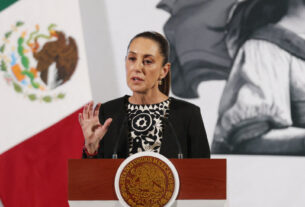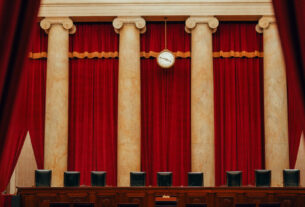As far as the Trump administration is concerned, there are government secrets and then there are government secrets.
Details sought by a federal court about a military flight of immigrants that landed many days ago with video cameras recording its arrival? Sorry, judge, too secret to reveal, even now long after the fact.
Details about an upcoming military strike against American enemies disclosed by the president’s top national security advisers on an unsecured group text chat? Not classified, not a breach of national security and not a big deal.
What constitutes an official secret in this new era in Washington, it turns out, seems to depend on who is asking and who is telling. The juxtaposition of two cases involving sensitive information in the same week reinforces just how situational President Trump’s approach to government secrecy can be.
And it illustrates Mr. Trump’s remarkable capacity for bending political reality to his will without worrying about facts or consistency. After all, this is a president who has made Canada and Europe out to be enemies not allies, who rewrote history to claim that Ukraine started the war with Russia and who sent lawyers to court to argue that Elon Musk is not really in charge of the Department of Government Efficiency.
This has become so common that the disparity in what constitutes a secret played out without much acknowledgment of the disparity. On the one hand, the Trump administration invoked the so-called state secrets privilege to defy a federal judge trying to determine whether its no-hearing, no-due-process deportation of immigrants was legal. On the other hand, Mr. Trump brushed off the stunning disclosure of a planned attack on Houthi militants on a group chat that inadvertently included a journalist on the commercial platform Signal.
“What’s baffling is the claim that pending military operations are not so sensitive after all, while the facts of a widely reported deportation that has already occurred cannot be disclosed,” said Steven Aftergood, who spent decades on government secrecy issues at the Federation of American Scientists. “It’s hard to take secrecy seriously as an instrument of national security when it is being manipulated so obviously for self-serving political ends.”
In both cases, the information at the heart of the issue is a time stamp. In the immigration case, Judge James E. Boasberg has ordered the administration to tell him what time the plane transporting Venezuelans deemed to be gang members took off from U.S. soil, what time it left U.S. air space, what time it landed and what time the migrants were officially transferred out of U.S. custody.
The judge wants those details to determine whether the administration illegally violated his order to turn the plane around. The administration has said that information is too sensitive to give to him.
In the case of the Signal chat, Defense Secretary Pete Hegseth gave colleagues on the group chat (and the journalist mistakenly added to it) the precise time that U.S. warplanes and drones would strike the Houthis a couple hours beforehand.
Presumably, that information might have been of some use to those Houthis being targeted, had they known it. But the White House and Mr. Hegseth are essentially saying that that information actually was not all that sensitive.
“We have said all along that no classified material was sent on this messaging thread,” Karoline Leavitt, the White House press secretary, said at a briefing this week. “There were no locations, no sources or methods revealed and there were certainly no war plans discussed.”
She did not mention the time estimates. Instead, when pressed about them by reporters, Ms. Leavitt changed the subject and attacked the journalist, Jeffrey Goldberg, editor in chief of The Atlantic, and Democrats for making too much of the whole thing. She then assailed former President Joseph R. Biden Jr. for the botched troop withdrawal from Afghanistan.
National security veterans in both parties scoffed at the contention that the details that Mr. Hegseth provided about the imminent strike were not classified during the group chat that also included Vice President JD Vance, Secretary of State Marco Rubio, the national security adviser Michael Waltz and others.
“There is absolutely no way in which the information shared in that group chat was not classified at the highest levels,” said Oona Hathaway, a former Pentagon lawyer now at Yale Law School. “I’m frankly stunned that anyone would try to suggest otherwise. Such detailed information about an imminent military operation is precisely the kind of information that is most closely guarded.”
She added: “This is all the more absurd in light of the government’s assertion that the state secrets privilege permits it to withhold information from the district court about a plane of migrants that had already landed.”
While less sensational secrecy lapses have typically triggered serious investigations involving possible criminal liability, Attorney General Pam Bondi on Thursday seemed to suggest that she did not plan to pursue the issue.
Just last week, though, Ms. Bondi’s deputy, Todd Blanche, announced that the Justice Department was opening a criminal investigation into a leak to The New York Times about the Venezuelan gang Tren de Aragua. In his announcement, Mr. Blanche said that the leaked information was “inaccurate but nevertheless classified.” How false information could be classified, he did not explain.
Mr. Trump has always viewed violations of national security secrecy through the lens of who is doing the violating. He won the presidency for the first time in 2016 at least in part by excoriating his opponent, former Secretary of State Hillary Clinton, for using an unsecure private server to send email while in office. He led crowds in chants of “lock her up” and declared that if he were elected “no one will be above the law” when it comes to endangering government secrets.
But once he got to office, Mr. Trump regularly disregarded warnings about protecting government information. He posted sensitive satellite imagery of Iran online. He kept using an unsecured mobile phone even after being told it was monitored by Russian and Chinese intelligence agencies. He tore up official documents and threw them to the floor despite laws requiring they be preserved, leaving aides to collect the pieces and tape them back together.
Most memorably, of course, Mr. Trump took classified documents when he left the White House in January 2021, storing them in a shower, an office, a bedroom and a ballroom at his Mar-a-Lago estate and defying a subpoena requiring him to return them. When the special counsel Jack Smith later indicted him over his handling of secrets and conspiring to obstruct justice, Mr. Trump derided the case as partisan persecution.
When Mr. Biden was found to also have classified documents at his home in Delaware, however, Mr. Trump expressed outrage, even though Mr. Biden, unlike Mr. Trump, promptly reported the discovery himself, returned the documents and cooperated with investigators. “Trump was peanuts by comparison,” Mr. Trump declared at one point, referring to himself in the third person.
Even on Thursday, Mr. Trump’s team fell back on a whataboutism defense, insisting that the disclosure of a military operation in advance on a Signal chat was a nothingburger compared to Democratic transgressions.
“If you want to talk about classified information, talk about what was in Hillary Clinton’s home,” Ms. Bondi told reporters. “Talk about the classified documents in Joe Biden’s garage, that Hunter Biden had access to.”
Investigators established that none of the emails Mrs. Clinton sent or received on her private server had headings marking them as classified. Only after the fact did officials conclude that 110 emails in 52 email chains out of 30,000 emails contained classified information at the time they were sent or received.
That was nonetheless enough to prompt an F.B.I. inquiry that, while it did not result in criminal charges, proved embarrassing enough that it helped cost Mrs. Clinton the presidency. Likewise, a special counsel investigation of Mr. Biden produced no charges but included the politically damaging characterization of the president as a “well-meaning, elderly man with a poor memory” and “diminished faculties in advancing age.”
While Ms. Bondi did not seem troubled enough by the Trump team’s disclosure of attack plans to even initiate an investigation, her department went to court this week to protect the secrecy of information that could compromise the Trump administration politically and legally.
The flight data for the deportation of Venezuelan immigrants would help Judge Boasberg figure out whether the administration ignored his order to turn the plane around so that he could first decide whether the expulsion was legal.
Ms. Bondi’s department refused to comply, arguing in a brief that disclosure “would pose reasonable danger to national security and foreign affairs.” How that would be a danger once the flight was over was not clear, but the administration included a declaration from Mr. Rubio saying that it would “erode the credibility of the United States’ assurances” to other countries “that information will be maintained in confidence.”
However, the government of El Salvador, which agreed to the Trump administration request to accept and imprison the Venezuelan migrants, was hardly trying to keep the matter secret. Indeed, the country’s president posted a video of the arrival. Hiding the time of the arrival did not seem a matter of concern.
In an example of a Washington oddity, the two cases converged in a way on Thursday when the same Judge Boasberg, acting in a separate lawsuit filed in response to the attack plan group chat, ordered the Trump administration to preserve all Signal messages from March 11 to 15 to comply with federal records law.
“This administration is doing more to discredit national security secrecy than critics ever did,” Mr. Aftergood said. “There have always been abuses and excesses in official secrecy policy. But everyone accepted that there were also genuine secrets, including details of imminent military operations, identities of intelligence sources and so on.”





